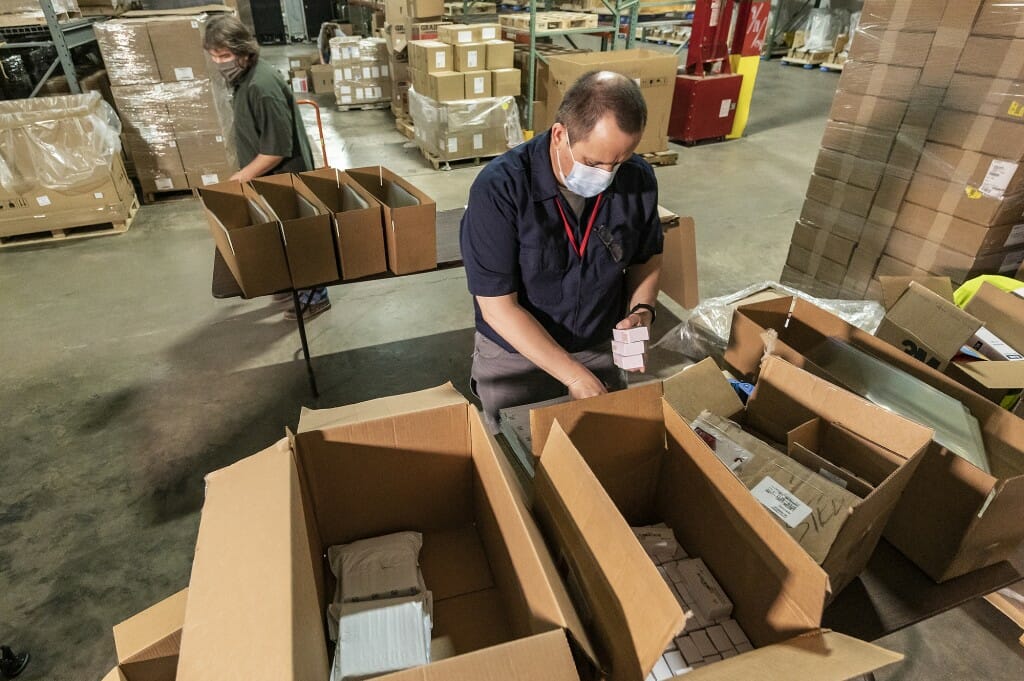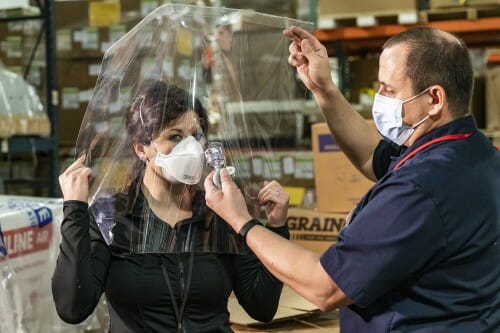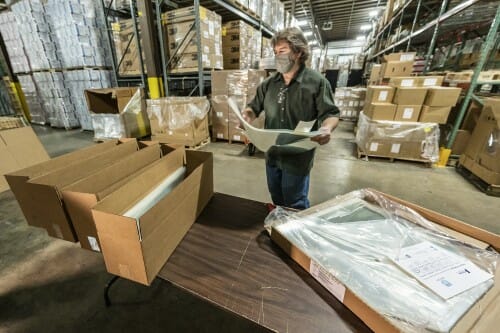WisCon helps small businesses through COVID-19 pandemic

Ernie Stracener (right), consultation program manager, and Dan Trocke (left), safety consultant with the Wisconsin State Laboratory of Hygiene at the University of Wisconsin–Madison, pack PPE supplies into boxes at a warehouse in Madison. Photo: Bryce Richter
From February through June, we will highlight the ways that UW–Madison powers the state’s economy through research and innovation, educates the next generation and reaches out to Wisconsinites to improve their lives. March’s theme is Health. Watch for more at #CantStopABadger and #UWimpact on social media. Your support can help us continue this work.
The COVID-19 pandemic brought a host of new needs for Wisconsin businesses: They had to learn how to keep their facilities, employees and customers safe from this new disease.
In stepped the Wisconsin State Laboratory of Hygiene’s WisCon Safety and Health Consultation Program, which for 40 years has provided free consulting services and training to businesses with fewer than 250 employees to help them provide safe and healthy workplaces and meet the requirements of the U.S. Department of Labor’s Occupational Safety and Health Administration.
Since July 1, 2020, six of the program’s 16 consultants have dedicated half of their time to COVID-19 consulting and training, which includes virtual assessments of facilities, recommendations for controlling employee exposure, and video training on COVID-19 prevention and control.
The program created these new services from scratch at the request of the Wisconsin Department of Health Services. The services are funded by a Federal CARES grant that goes through November 2022.
“We created a COVID-19 preparedness and response plan template that we provide to businesses who need protocols,” says WisCon Program Manager Ernie Stracener. “We help them determine what they need, based on that template, and they get a lot of guidance through that.”
The WSLH is the state’s public, environmental and occupational health laboratory, and it’s part of the University of Wisconsin–Madison.

Ernie Stracener (right), consultation program manager, demonstrates fitting Danica Harrier, industrial hygiene consultant, both with the Wisconsin State Laboratory of Hygiene, for an N95 respirator. Photo: Bryce Richter
WisCon hosts weekly webinars with live question and answer sessions that attract representatives from 10-to-12 businesses each week.
“It’s nice to provide that direct service,” says Stracener. “We are also providing assistance and OSHA-focused COVID assistance to DHS, and that has been very useful for them.”
WisCon also offers free COVID-19 Respiratory Protection Program Administrator Training to support skilled nursing and residential care facilities, of which Wisconsin has about 5,000.
“We are preparing, packaging, and sending about 3,000 respirator fit-test kits to facilities who request them from DHS,” says Stracener. “We made a series of training videos and provide remote consultation as needed.”
The WisCon program is largely funded overall by a grant from OSHA. It provides support to Wisconsin’s small businesses. Nearly half of all workers in Wisconsin are employed by a business with fewer than 500 employees.
OSHA estimates that the program has an annual average benefit to Wisconsin of $33.6 million.
“Our program’s total funding is $1.8 million a year, so that’s a tremendous return on investment,” says Stracener. “Almost every week, we hear from somebody who says, ‘How did we not know about you?’ This is all funded with tax dollars.”
Free Health & Safety Consultations
Beyond the services WisCon has provided since the start of the COVID-19 pandemic, the program offers free and confidential occupational safety and health consultation services to small business owners and senior managers in the state. These services include identifying workplace hazards, performing industrial hygiene employee exposure sampling and assessment, or helping clients develop and implement a comprehensive safety and health management program.
Stracener assigns one of the program’s 16 consultants, which includes safety specialists and industrial hygienists, to work with the business.
“If we look back in 2019, we did 453 on-site consultations for 350 businesses in Wisconsin, and that’s pretty typical on a year-to-year basis,” says Stracener, who sees this as a measure of the program’s success. Once companies experience the benefits of WisCon consulting, they often return.
“We’re the state’s largest professional health and safety consulting firm, and it’s free,” he adds. “We will do anything an employer needs us to do to help them stand on their own two feet to meet OSHA requirements.”
The consultation process begins with a phone call and continues with a site visit (site visits have been conducted virtually during the pandemic)..
“We’ve pivoted to providing virtual consultations, where we provide some of the same benefits of on-site services by working with the client to do hazard surveys of specific areas,” says Stracener. “They take photos, and we work through the photos with them, or we do a video tour with them, and the consultant provides expert assistance from off-site and still helps them achieve the same goals.”

Dan Trocke, safety consultant with the Wisconsin State Laboratory of Hygiene at the University of Wisconsin–Madison, packs PPE supplies into boxes at a warehouse in Madison. Photo: Bryce Richter
As COVID-19 case rates continue to drop throughout the state, WisCon is working to resume in-person, on-site, consultation services.
Consultants help employers identify and correct hazards and provide chemical exposure monitoring and noise monitoring as needed.
Client services are voluntary, free, and confidential, and there are no penalties or enforcement action. The client’s primary obligation is to correct identified hazards.
WisCon helps provide recommendations for how to fix them, negotiates a correction timeline with the employer and sets a correction due date.
“In an imminent danger situation, like someone standing on the top step of a ladder who could fall and be severely injured, we make sure the hazard is corrected on the spot,” explains Stracener. “A serious hazard, like a broken electrical outlet, is something that can directly impact the health and safety of an employee to cause serious harm.”
Businesses working with WisCon to correct hazards cannot be fined by OSHA for the hazards while they are in the process of being corrected. WisCon documents corrected hazards and federal law protects consultation visit records from public disclosure.
“We try to have all corrections done, documented, and completed within 60 days,” says Stracener. “There’s a window of time where the employer can make corrections, and if something is a really big hazard, like spraying flammable paint inside a facility, they might need to put in a spray booth, and that can take more time to correct. We can help them devise interim protections while they correct the hazard. It really is a partnership.”
Recognition for Companies with Best Practices
WisCon also runs the state’s OSHA-sponsored Safety and Health Achievement Recognition Program, which recognizes companies with excellent health and safety management practices.
“We’re trying hard to identify new participants for that program and grow Wisconsin’s number from eight to 30 or more,” says Stracener, who says it’s inspiring to see new businesses join the program and reinforce the work WisCon performs.
“When we are challenged with someone who comes to us with a problem, and we are able to help them get to a resolution in a relatively short period of time and see the difference that makes, it is so rewarding,” says Stracener. “I’ve been in occupational health and safety for about 30 years, and this is far and away the most rewarding job I’ve ever had, because of the people we meet and serve and the scope and breadth of what we do.”
UW-Madison contributes $20.8 billion per year to the Wisconsin economy, and UW–Madison related start-ups contribute an additional $10 billion. Read more here.
Tags: covid-19, health & medicine, UW impact



